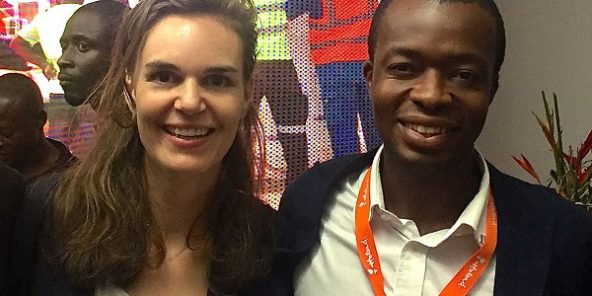Based in Ivory Coast, the Christmas company Kombo N’Guessan and Louise Bijleveld proposes to manufacture fertilizer and biogas from organic waste produced by communities and agro-industries in West Africa.
On December 19th, Jean-Bernard Levy, CEO of EDF, rewarded in Paris the three winners of the first edition of the EDF Pulse Africa Awards. Among them, Lono, a project led by the Ivorian Noël Kombo N’Guessan and his Dutch fiancée Louise Bijleveld, to create fertilizer and biogas from organic waste.
“We are a social enterprise, our goal is above all to allow rural populations to increase their agricultural production and to have energy to cook, while enhancing their waste,” said Noël N’Guessan.
Born in Abidjan in 1988, he followed his father, an executive at Unilever, in his career in Zambia, Zimbabwe and South Africa. After a British baccalaureate (Cambridge International A-Level) obtained in Harare, Zimbabwe, the young man started studying chemical engineering at McGill University in Montreal, before flying to Stellenbosch in South Africa. South, and to obtain his Master of Biosciences at the University of Ghent, Belgium, in 2015. “From my first years of study, in Canada, I had the idea to create a biotechnology company to value the waste, “he says.
Agricultural experience to understand the issues
The meeting with Louise Bijleveld, who was then studying international development, sociology and the promotion of gender, will give a new impetus to this project. The young woman undertook a section on the social impact and empowerment of women.
Back in Ivory Coast in 2015, the couple does not lose sight of his project, but prefers to start farming first. “We wanted to know the issues facing the populations we were going to work with, how fertilizers are used, why they can cause real environmental problems and public health …” says Noël N ‘ N’Guessan.
My goal is to propose a fertilizer specific to each locality, according to its needs in culture
In his laboratory, the latter also analyzes different mixtures of residues. “My goal is to offer a fertilizer specific to each locality, according to its needs in culture, but also its contribution in residues”, explains the engineer who ensures to be aware, while traveling, of the extreme diversity of situations. “We find this diversity inside Ivory Coast, that’s why we can not offer a turnkey system for households or even villages. Upstream of each contract, we therefore provide a feasibility study. Then, depending on the type of waste and the needs of the locality in terms of energy and fertilizer, we propose the installation and maintenance of the most suitable fermentation unit. You have to experiment every time to find the right formula, “he explains.
Projects with rural communities as with agribusiness
To study the optimal conditions for the recovery of waste, Lono has also launched, with partners in Ivory Coast and Germany, a garbage composting program with 300 households in the village of Tiassalé: “they are committed to us provide for one year their sorted waste. In exchange, we pay for their garbage collection tax, “explains Noël N’Guessan.
The industrialist will rent us a biogas unit. In exchange for this rent, he will see his energy bill decrease
But alongside its social action, the start-up also targets agribusiness in Ivory Coast, Mali, Benin, and in the longer term in Liberia. “We are currently conducting feasibility studies for various operators: breweries, slaughterhouses, agricultural processors. If we do business, the industrialist will rent us a biogas unit. In return for this rent, he will see his energy bill decrease, “says the founder of the company, whose goal is to have installed in 2019 ten of these units, for a production of one MW of electricity off-grid.
Profitability from the second half of 2018?
Noël N’Guessan and Louise Bijleveld, who have invested nearly 40,000 euros in equity to launch their business, hope that Lono will reach equilibrium in the second half of 2018. “We rely on our agricultural activities to achieve profitability and generate cash, “explains Noël N’Guessan, who indicates that Lono has embarked on market gardening and peanut production in Koun-Fao and plans to develop its own label, local and organic. This activity occupies six of its ten employees, the others being divided between the biotechnology unit and the commercial and administrative part.
These points will be stored on an electronic wallet and can be exchanged, either for fertilizer or for money
“Finding qualified and motivated human resources” was one of the biggest challenges in Lono’s co-founder’s journey, which also cites the need “to be in tune with the people we want to help, is not always easy.
The young company has completed the year 2017: in December, in addition to the second prize in the EDF Pulse competition (see below), which brings him an endowment of 10,000 euros and personalized support, the start-up has obtained 10 000 euros from Ignite contest.
Its co-founders are now thinking about the implementation of its TSP compensation system. “In exchange for their waste, we will give points to our suppliers. These points will be stored on an electronic wallet and can be exchanged, either for fertilizer or for money, “explains Noël N’Guessan.
EDF Pulse Africa competition: a first
The French energy group EDF launched in 2017 the first African edition of its start-up competition EDF Pulse, four years after the first competitions in France, the United Kingdom and Italy.
It was aimed at small structures (start-ups, micro-enterprises and SMEs) active in the off-grid electricity generation sector, electrical uses and services or access to water. They had to be domiciled in Africa and at least one co-founder had to be African. 97 companies participated.

Jeune Afrique


Leave a Reply